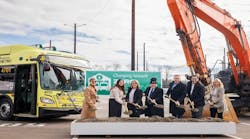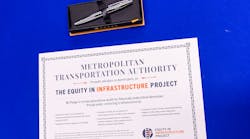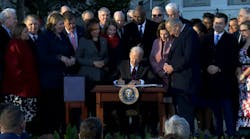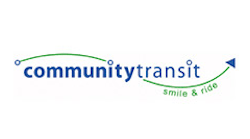King County Metro, Sound Transit, Community Transit and other regional transit partners sign ‘Equity in Infrastructure’ Pledge
King County Executive Dow Constantine, Seattle, Wash., Mayor Bruce Harrell, Sound Transit CEO Goran Sparrman, Port of Seattle Executive Director Steve Metruck, Community Transit CEO Ric Ilgenfritz and Regional President of Americas, Hill International Micheal Smith signed the ‘Equity in Infrastructure Pledge’ on Aug. 29 at Seattle’s historic Union Station.
“King County is committed to advancing equity in contracting and the Equity in Infrastructure Pledge aligns perfectly with our ongoing work to support minority and women-owned businesses,” Constantine said. “By amplifying opportunities for historically underutilized businesses, we seek to ensure that everyone has a fair chance to participate in and contribute to our region’s prosperity. This pledge is another expression of King County’s daily commitment to becoming a welcoming community where every person can thrive.”
The mission of the Equity in Infrastructure Pledge is to build generational wealth and reduce the racial wealth gap by improving public infrastructure contracting practices to create more prime, joint venture and equity contracting opportunities for Historically Underutilized Businesses (HUBs). Providing these opportunities also creates more competition, reducing costs to public agencies and allowing them to drive more value from their infrastructure dollars. Pledge signers are heads of transit authorities, airports, ports, water districts, and engineering, financial and construction firms from across the country – representing billions of dollars of power to improve people’s lives. The White House has directly called on Infrastructure Investment and Jobs Act grantees to sign the pledge.
Pledge aligns with efforts in King County
The pledge’s focus on increasing contract awards to HUBs aligns closely with efforts that King County, Wash., has already undertaken and will continue to expand. The county’s initial work began in 2003 with the launch of the Contracting Opportunities Program to support small contractors and suppliers by improving their access to King County contracts.
In 2021, Executive Constantine expanded the initiative by signing an Executive Order on Pro-Equity Contracting, ensuring that minority- and women-owned businesses are included in the program. The programs have sparked new ways to boost participation by minority and women-owned businesses (MWBE) in county contracts.
King County has made significant progress by:
- Launching a Fast Track Certification program for MWBE’s that are already certified. As a result, these businesses are now 84 percent of the county’s total number of more than 3,600 small contractor and supplier-certified firms. In 2023, $77 million in county contracts was awarded to these firms, with $35 million going to MWBE firms.
- Requiring equity plans from prime contractors for county-funded projects.
- Expediting payments through a Cash Flow Initiative.
- Partnering with organizations like Tabor 100 to support small businesses.
The Equity in Infrastructure Pledge also supports a nine-element action plan King County will implement during the next 12 months to help even more firms. The action plan aims to reduce certification barriers, improve goals and metrics and increase partnerships with other agencies to expand successful programs, such as a mentorship initiative for MWBE’s.
King County’s Strategic Climate Action Plan works toward an equitable future. The agency is making historic infrastructure investments in sustainability, including constructing two electric bus bases in Tukwila, Wash., –estimated to cost more than $500 million for the two facilities. The agency is also installing battery-electric bus charging infrastructure on existing depots and continuing significant ongoing state-of-good repair projects to maintain the agencies facilities.
The agency is also taking extra steps to expand HUB opportunities by increasing outreach efforts and exploring ways to facilitate HUB participation in work that will utilize new technologies and sustainable practices.





